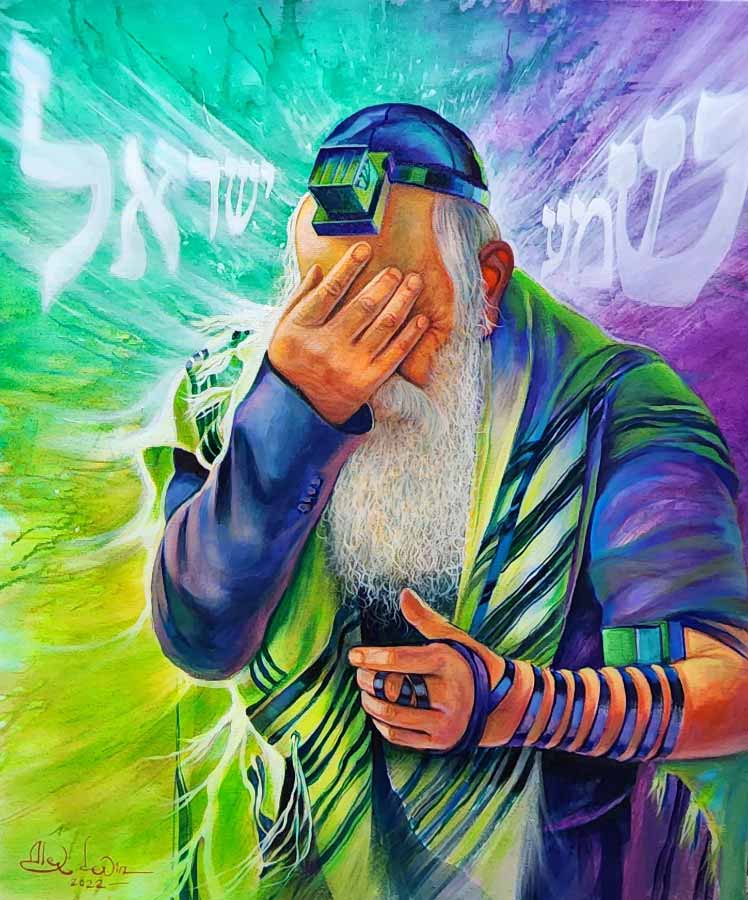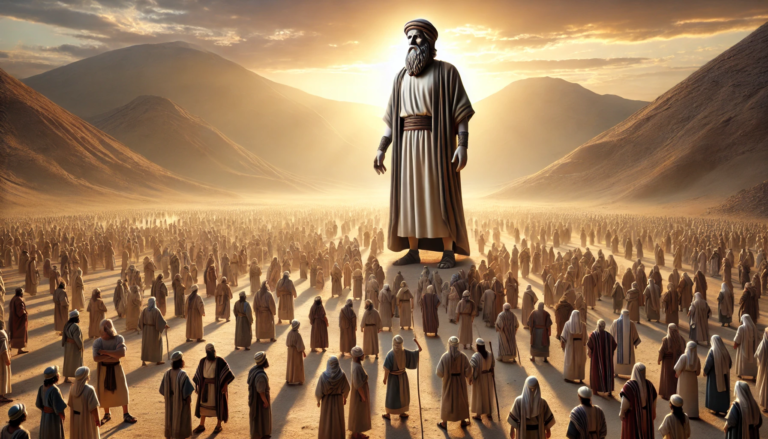How Transparent is Your Aspaklaria?

Upon seeing a skull floating on the water, Hillel said (Pirkei Avot 2:7): עַל דַּאֲטֵפְתְּ אַטְפוּךְ וְסוֹף מְטִיפַיִךְ יְטוּפוּן (Because you drowned others, they drowned you, and eventually those that drowned you will be drowned). He was teaching with a real-life example what the prophet Yeshaya said many years earlier (Yeshaya 3:11): אוֹי לְרָשָׁע רָע כִּי־גְמוּל יָדָיו יֵעָשֶׂה לּוֹ (Woe to the wicked person who does evil because the payback of his hands will be done to him). Perhaps a bit harsh, but that’s reality. Nevertheless, he also explained that it works the other way around (3:10): אִמְרוּ צַדִּיק כִּי־טוֹב כִּי־פְרִי מַעַלְלֵיהֶם יֹאכֵלוּ (Tell each righteous man [tzaddik] that it is good because they will eat the fruit of their deeds). And Shlomo ha-Melech in his wisdom expressed the same idea (Mishlei 27:19): כַּמַּיִם הַפָּנִים לַפָּנִים כֵּן לֵב־הָאָדָם לָאָדָם (As in water face answers to face [like a mirror], so the heart of one man to another man).
We call this principle מידה כנגד מידה [middah k’neged middah], tit-for-tat, the law of justice which governs the universe—“for every action there is an equal and opposite reaction” (Newton’s third law of motion)—and everyone in it. There is no way around it. Sooner or later, we will receive payment both for the good and for the bad ways that we treated others. If we treated others with compassion, in the end we will be treated compassionately. If we showed harshness, we will be treated harshly. But there is much more to middah k’neged middah than just recompense for one’s deeds.
First, we should know that middah k’neged middah is a wonderful gift for our lives in the present. Instead of disliking those moments when we know that we ‘got what we deserved’, we should be very thankful for them. They are literally a gift from Hashem. How so? We have all attended instructional or even corrective types of lectures where the speaker encourages us to improve ourselves. Most of the time though, we walk away from such experiences empty-handed, needing a more individualized objective assessment from someone who really knows us. This is the benefit of middah k’neged middah. It is the detailed assessment specifically tailor-made for us. Therefore, if we are attentive, we can use middah k’neged middah as a tool to fix our deficiencies, shortcomings and weaknesses. We just need to keep in mind that every time someone mistreats us, Hashem is showing us our problems that we need to work on. It does us no good to point out the flaw in the other person’s behavior because that completely misses the point. By criticizing the other person, we are discarding the object lesson that Hashem arranged to teach us. At a deeper level, we are also bad-mouthing, i.e. speaking lashon ha-ra against, Hashem. As David ha-Melech said (Tehillim 145:9): טוֹב־יְיָ לַכֹּל וְרַחֲמָיו עַל־כׇּל־מַעֲשָׂיו (Hashem is good to all and His compassions are upon all of His works).
But middah k’neged middah operates on an even deeper level, on a moment by moment basis throughout our lives. The Baal Shem Tov taught (Bereshit 127):כי האיש אשר הוא נקי לגמרי ולא פגם כלל מעולם אפילו כל שהוא אי אפשר לו לראות רע בשום אדם או שישמע מרע שיעשה שום אדם כי לא יזמין לו השם יתברך לראות רע או לשמוע שום רע, ולכן כשרואה האדם איזה איש שעושה רע או שמספרים לפניו מאיזה איש שעשה רע ידע בבירור שיש בו שמץ מנהו מאותו הדבר עצמו ואף אם הוא צדיק מכל מקום יש בו קצת דקצת מאותו ענין והזמין לו השם יתברך ראייה זהו או שמיעה זו כדי שישים אל לבו לשוב ולתקן הפגם ההוא (It is impossible for a person who is completely clean and without any flaw whatsoever to see or hear about evil in anyone, because Hashem will not invite him to see or hear any evil; therefore, when a person sees someone doing an evil thing or if he is told about it, he should know beyond any doubt that there is in himself a stain of that very same evil, and even if he is a tzaddik there must be a minute trace of that sin, and Hashem invited him through this seeing or hearing to deeply consider it in order for him to repent of it and fix the flaw).
In the language of the Torah, this phenomenon is caused by the aspaklaria, typically translated as either mirror or lens. In psychological terms, it is known as projection. For better or worse, we project onto others what is within ourselves. For example, if we harbor a bad or negative character trait [middah], then we will project it onto others and judge them as having this negative middah (whether they actually have it or not). And of course, it works the other way around too—if we have perfected a good middah, then when we look at others, we will judge them for merit and assume that they must be behaving in a way that reflects that same good middah.
So what is our aspaklaria? Is it a mirror or is it a lens? A mirror is not a lens; a mirror reflects light, a lens transmits it. Bringing down the laws of purity with respect to glass objects, the Mishnah teaches (Keilim 30:2): אַסְפַּקְלַרְיָא טְהוֹרָה (An aspaklaria is always ritually pure). The Rav explains that it is a mirror such as commonly used by a woman to view her face. On the other hand, the Rambam holds that it is a glass lens, explaining that the word comes from ספק [safek] meaning ‘doubt’ and ראיה [re’iyah] meaning ‘seeing’, i.e. an object which when looked through produces an unclear view or perception. So who is correct? They are both correct because the way we view the world and everyone in it depends on us. In reality, our aspaklaria can be a spectrum of possibilities. At one end of the spectrum, it can be a clear glass that is so transparent that if you were to look through it you wouldn’t even know that it’s there. And at the other end of the spectrum, it’s mostly a mirror. Psychopaths and narcissists see the world through what is mostly a mirror that doesn’t allow the light of others to pass through to them. As a result, they constantly project themselves along with their flaws onto everyone and everything they encounter. They end up having a severely distorted perception of the world. On the other hand, tzaddikim see the world and everyone in it through a very translucent lens that allows the light of others to pass through to them. They rarely project any imperfections or flaws onto others because they don’t have them in the first place; therefore, they are able to perceive the sparks of goodness in everyone and in everything. Such people have a highly perfected view of the world. Most of us are somewhere in the middle. As is known, Moshe Rabbeinu was the only prophet ever to have had a completely clear vision without any distortion, as Hashem testified (Shemot 33:11): וְדִבֶּר יְיָ אֶל־מֹשֶׁה פָּנִים אֶל־פָּנִים כַּאֲשֶׁר יְדַבֵּר אִישׁ אֶל־רֵעֵהוּ (And Hashem would speak to Moshe face to face like one person speaking to another). He not only had clear perception of the Divine Presence [Shechinah], but he also saw everyone else through that same transparent aspaklaria with no trace of ‘self’ getting in the way. As a result, he was able to see only the good in everyone and in everything.
So when we witness or hear about a character flaw in someone else, even if they didn’t do anything against us in any specific way whatsoever, there is no room to criticize. Hashem is speaking to us and telling us that even if we don’t think we have such a flaw in ourselves, at the very least, we must have a subtle form of that same flaw.
We are now equipped to understand how it could be that anyone could have accused Moshe of adultery. When Moshe Rabbeinu heard the accusations being leveled against him by Korach and his colleagues, the Torah records his reaction (Bemidbar 16:4): וַיִּשְׁמַע מֹשֶׁה וַיִּפֹּל עַל־פָּנָיו (And Moshe heard and he fell on his face). The Gemara explains further (Sanhedrin 110a):מה שמועה שמע אמר רבי שמואל בר נחמני א"ר יונתן שחשדוהו מאשת איש…א"ר שמואל בר יצחק מלמד שכל אחד ואחד קנא את אשתו ממשה (What report did Moshe hear? R' Shmuel bar Nachmani said R' Yochanan said that they suspected him of having illicit relations with a married woman…R' Shmuel bar Yitzchak said this teaches that everyone warned his wife against being secluded with Moshe). This seems preposterous! How could it be? Obviously, they were projecting their own flaws whether in desire or deed onto Moshe. And since it is written elsewhere (Bemidbar 12:3): וְהָאִישׁ מֹשֶׁה עָנָו מְאֹד מִכֹּל הָאָדָם אֲשֶׁר עַל־פְּנֵי הָאֲדָמָה (And the man Moshe was very humble, more than any other person on the earth), we will let the reader consider what Moshe must have thought about Korach.
But to give you a clue, consider what Rebbe Nachman taught in perhaps what is his most well-known lesson (Likutei Moharan 282): דַּע כִּי צָרִיךְ לָדוּן אֶת כָּל אָדָם לְכַף זְכוּת וַאֲפִלּוּ מִי שֶׁהוּא רָשָׁע גָּמוּר צָרִיךְ לְחַפֵּשׂ וְלִמְצֹא בּוֹ אֵיזֶה מְעַט טוֹב שֶׁבְּאוֹתוֹ הַמְּעַט אֵינוֹ רָשָׁע וְעַל יְדֵי זֶה שֶׁמּוֹצֵא בּוֹ מְעַט טוֹב וְדָן אוֹתוֹ לְכַף זְכוּת עַל־יְדֵי־זֶה מַעֲלֶה אוֹתוֹ בֶּאֱמֶת לְכַף זְכוּת וְיוּכַל לַהֲשִׁיבוֹ בִּתְשׁוּבָה (Know that it is necessary to judge the whole person for merit, and even with someone who is completely wicked [rasha] it is necessary to search and to find in him some good point, that in that little point he is not a rasha, and by finding in him a little good and judging him for merit he truly raises him to merit, and he is able to return him to teshuvah).
It is not only Moshe’s responsibility, it is our responsibility.


![Blood [is] Money](https://www.theshoemakerreport.com/wp-content/uploads/2025/02/doctor.healer-768x429.jpeg)



